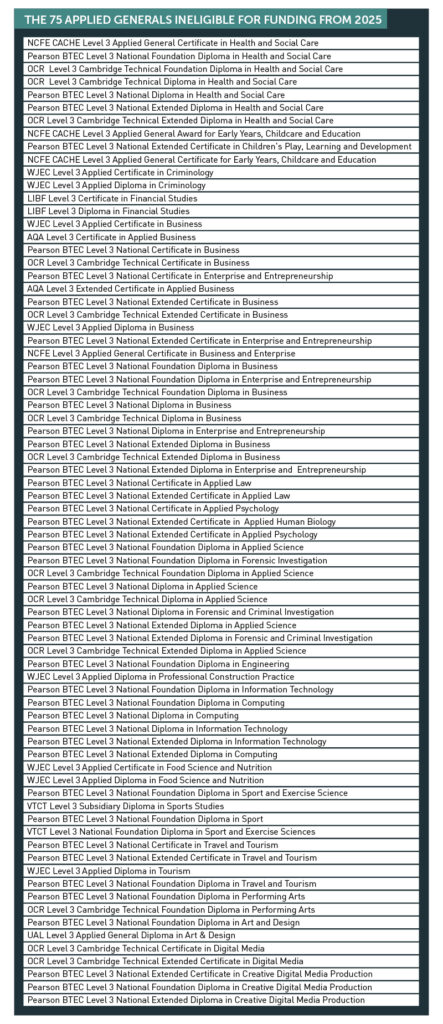Ministers are under fire for reneging on their promise to axe a “small” proportion of BTECs and other applied general qualifications, as new analysis reveals that more than half will be scrapped by government edict.
A cross-party group of peers led by Lord Blunkett has vowed to confront education secretary Gillian Keegan on the issue. “This, at best, is an act of considerable bad faith and, at worst, an indication that the government’s word isn’t worth the paper it was written on,” Blunkett said.
College leaders have warned the “ideologically driven” reform could cause “significant chaos”, as the plans would wipe out provision currently offered to almost two-thirds of sixth-form college students and almost a third of courses available in general FE colleges.
‘A clear reversal of the undertakings given last year’
The Department for Education is working to introduce a streamlined system for students finishing their GCSEs that pushes them to study either A-levels, their new technical equivalent T Levels, or an apprenticeship.
Officials have already announced that 106 alternative technical level 3 courses will have their funding removed from 2024 because they “overlap” with the first few T Level courses. Others face the chop in future years as more T Levels roll out to allow the qualifications to “flourish”.
The DfE launched the next phase of its level 3 review earlier this month, which involves a new strict approvals process that all “alternative” technical and academic applied general qualifications, such as Pearson’s popular BTECs, must pass to retain their funding.
But a guide published this month states that ministers have made the “conscious choice” to exclude “certain” academic qualifications from this process, either because the subject is “more suited to a technical qualification or because there is an associated A level”.
When the list of qualifications eligible for funding is mapped against the 134 recently reformed applied general qualifications currently available to young people and included in the DfE’s performance league tables, an “astonishing” 75 are found to be ineligible.
It means well-established qualifications, such as BTECs in health and social care, applied science, and law will disappear from 2025.
Experts also predict that many of the eligible courses will fail to gain approval through the new process.
The analysis, shared exclusively with FE Week by the Sixth Form Colleges Association that leads the Protect Student Choice campaign, shows that 62 per cent of applied general students in the sixth-form college sector are currently enrolled on qualifications that will be scrapped before the approval process begins.
This comes despite then education secretary Nadhim Zahawi promising the sector and Parliament through the passage of the skills and post-16 education bill that “only a small proportion of the total level 3 BTEC and other applied general style qualification offer – significantly less than half” would be removed.
Bill Watkin, chief executive of the Sixth Form Colleges Association, criticised the government for their decision not to run a “transparent and impartial approval process”.
He also criticised officials for not being clear about what evidence was used to draw up the list of subjects that will be funded in the future, describing their decisions as “indefensible and entirely unnecessary”.
Blunkett hit out at ministers for a “clear reversal of the undertakings given last year” after promising the Lords “in writing and from the despatch box that only a minority of advanced qualifications would cease to be funded”.
He told FE Week: “This is either a mistake that can be easily rectified, or a deliberate and calculated U-turn.
“A range of peers from all parties have agreed to take this matter up with education secretary Gillian Keegan, and I feel sure that she will want to demonstrate her honesty and integrity and act accordingly.”
Toby Perkins MP, Labour’s shadow skills minister, said the government’s reassurances on level 3 choice “have been shown to be hollow” and called on officials to “work with the sector and think again before pursuing this approach”.
A DfE spokesperson said: “Our reforms are intended to help more people to progress into work, an apprenticeship or on to further study, so it’s vital that the qualifications on offer are of the highest possible standard.
“We have already introduced T Levels as the new gold standard technical qualification and the changes we are making through our review will make sure only qualifications that are necessary, lead to good outcomes for students and meet the skills needs of businesses are approved for public funding.”
‘Reforms could cause significant chaos’
College principals have warned that the government’s plans create more problems than they solve.
A quarter of Oldham Sixth Form College’s 2,300 students are currently studying applied generals that face the chop in years to come, mostly extended BTEC diplomas in health and social care and applied science.
Associate principal Suzannah Reeves told FE Week that both “highly valued” courses are “incredibly successful, with many students progressing onto university, locally and nationally, into science, nursing and early childhood jobs”.
Her college is particularly concerned at losing health and science BTECs because of the major issues with their T Level counterparts last summer, which led to results for over 1,000 students being regraded. Many dropped out of the course after this debacle and transferred to a BTEC instead.
Reeves said her college now has “little confidence in the quality assurance of awarding, of the examination design and of coursework aspects of the T Level”.
She added that applied science BTEC is also vital for students who did not achieve a grade 4 or above at GCSE but want to pursue a career in the field.
“A-levels are not easily accessible for these students because of the content they have covered at school, usually on the foundation pathway,” she said.
“For those students wanting to take the BTEC applied science from 2025, they would have to go on to A-level single sciences or a combination of single diplomas and A-levels. I think their educational experience would potentially be poorer as a result.”
Graham Pennington, principal of Sandwell College in the West Midlands, said around half of his 4,000 level 3 students would be impacted by the DfE’s reforms. Of those, about 80 per cent would not have an “obvious and clear” alternative to transfer onto.
He said he sees T Levels as a positive step in technical education but warns the new qualifications are not suitable for many disadvantaged learners.
Pennington echoed Watkin’s concern that ministers have failed to evidence their decisions to date. “There’s a lot of assumptions as you listen to the narrative but not evidence-based assertions,” he said.
“Everyone wants to see the new qualifications succeed, but not by removing choice and opportunity.”
Reeves added: “It feels like this reform has been ideologically driven, and it has the potential to cause significant chaos.”


















It’s not like previous history is pointing to where T levels will end up and that these actions will result in their reintroduction in the future, having caused significant damage to young people and the BTEC brand?
I would argue some institutions and associations in the sector are complicit in this mess. If Principals stopped inviting ministers and MPs and showing them their wonderful T levels, then those photo ops wouldn’t give cover to officials and ministers to carry on regardless. I would say to those principals you’re not biting the hand that feeds you, you’re not putting your going at risk, it’s simply a matter of telling truth to power. If you can’t tell the whole truth then don’t be surprised when politicians lie to get their own way. The AoC has also been woefully late to the party. All the ‘access’ in the world hasn’t stopped any of this. How about stumping up some of membership fees, stop writing letters to ministers and maybe pay for a judicial review process. It may not succeed but it would have all those officials worried about their ‘advice’ being fully exposed. Alas I think neither will happen. I look forward to Gillian Keegan cutting a ribbon next to a grinning principal and hangers-on using you as political propaganda while your IAG and curriculum staff struggle to advise your students what ‘choices’ they have nowadays.